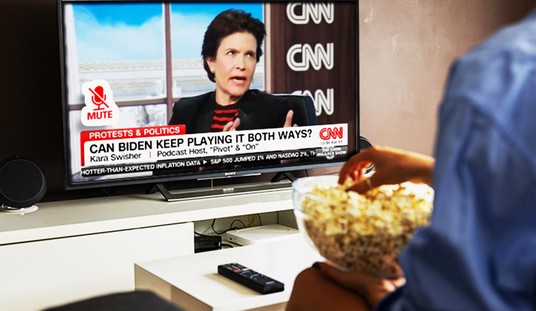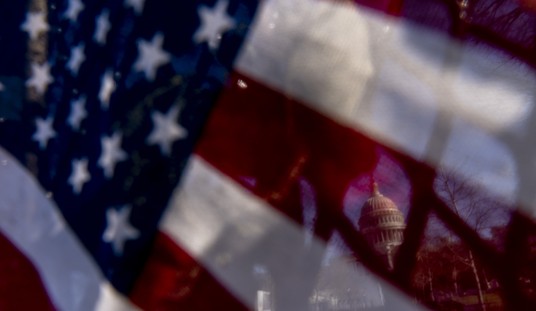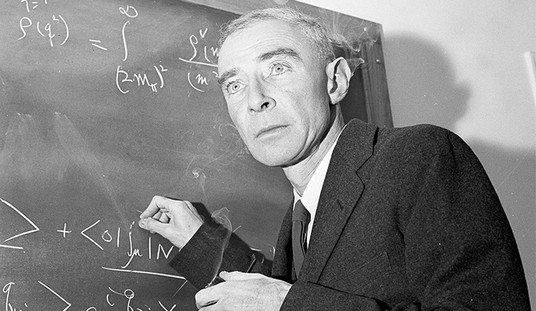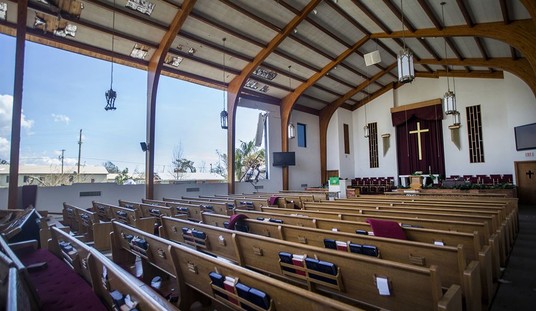Well, if Allahpundit gets to write a post about a statue of Satan arriving in Oklahoma, let’s open up a thread nearer the other end of the spectrum. For Catholics around the world, the embrace of Pope Francis has been a heady change from the normal coverage the Church receives from the media, but his popularity has had an interesting side effect, too. The impulse of ideologues across the spectrum to seize on the Pontiff’s soundbites to validate their own agendas might pay testimony to the truth of the Gospel and Catholic teachings, which haven’t changed at all under Francis, but it’s the kind of exploitation that the Vatican would prefer to avoid, as John Allen reports:
A recent comment by Pope Francis about educating the children of homosexual couples is being twisted both by the political right and left to suggest that the pontiff has waded into a debate over same-sex unions, according to a key papal confidante.
Jesuit Fr. Antonio Spadaro, editor of the influential journal Civiltà Cattolica, published a front-page essay in today’s Corriere della Sera, Italy’s paper of record, responding to widespread claims in the Italian media of an “opening” by Francis to legal recognition of same-sex relationships.
In fact, Spadaro wrote, Francis has no intention of “legitimizing any behavior that’s inconsistent with the doctrine of the church.”
The effort to twist the pope’s words, Spadaro wrote, comes both “from his ‘detractors’ on the right, as well as those who exalt him in order to take advantage of him on the left.” He called those efforts “misleading” and a form of “manipulation.”
This was a particularly amusing episode in this trend of papal sound-biting. This is what Pope Francis actually said in a lengthy exhortation to religious orders about welcoming all to the Church:
The pope told the leaders of religious orders that a great challenge for the Church would be to reach out to children living in difficult or unorthodox domestic situations.
“The situation in which we live now provides us with new challenges which sometimes are difficult for us to understand,” the pope said, according to the transcript of the conversation.
“How can we proclaim Christ to these boys and girls? How can we proclaim Christ to a generation that is changing? We must be careful not to administer a vaccine against faith to them,” he said.
This didn’t have much to do with same-sex unions themselves, actually, but the children who live in non-traditional families. How should the Church preach the Gospel in love to these boys and girls in a way that attracts them to faith, rather than insult their family structures needlessly? The Italian media leaped on this in the context of a political debate over same-sex marriage, and the interpretation spread rapidly. Those who favor its establishment seized on the remarks to vindicate that position, while those who fear the shift in pastoral focus found reasons to worry that the Vatican was about to make radical changes. Neither of these are the case.
That doesn’t stop people from using Francis as a prop for their political arguments, though. The New York Times provided its perspective on this phenomenon in Washington DC over the weekend:
As lawmakers return to the capital this week and mark the 50th anniversary of President Lyndon B. Johnson’s declaration of a “war on poverty,” Democrats — including those Catholics whose politics have put them at odds with a conservative church hierarchy — are seizing on Francis’ words as a rare opportunity to use the pope’s moral force to advance issues like extending unemployment benefits and raising the minimum wage.
“He has given a number of us in the political ranks encouragement, and really a challenge, to step up and remember many of the values that brought us to public life,” Mr. Durbin said.
Francis’ denunciation of an “economy of exclusion” goes to the heart of the debate between the two parties over the role of government. Democrats like Mr. Durbin and President Obama — whose administration is facing off against Catholic nuns in the Supreme Court over birth control provisions in his health law — quote the pope in speeches, using his words to reinforce their positions. Republicans find themselves forced to justify votes to cut food stamps and unemployment benefits even as they try to counter the perception that they are indifferent to the poor.
But though the pope has caused unease among Republicans as they reconcile his critique of capitalism and “trickle-down theories” with their free-market views, some Catholic Republicans see opportunity in his words.
Representative Paul D. Ryan of Wisconsin, a potential 2016 presidential candidate who speaks of poverty in the context of his faith, has praised Francis for “breathing new life into the fight against poverty,” and is working on a Republican plan to address the issue. Newt Gingrich, the former House speaker and now a co-host of CNN’s “Crossfire,” said he would talk more about poverty on the program.
“I think every Republican should embrace the pope’s core critique that you do not want to live on a planet with billionaires and people who do not have any food,” Mr. Gingrich said. “I think the pope may, in fact, be starting a conversation at the exact moment the Republican Party itself needs to have that conversation.”
In many respects, Francis’ economic views are consistent with church doctrine and the views of previous popes, though John Paul II spoke more about the benefits of capitalism in the context of his anti-Communist views. But with his humble style and off-the-cuff remarks, Francis is seen as shifting the church’s emphasis and tone.
By playing down issues like abortion and same-sex marriage, the pope has also upended an order in Washington, where conservatives have long viewed the church as an ally.
Except Pope Francis hasn’t played down abortion in his pontificate. The more accurate analysis is that the media doesn’t give nearly as much attention to his sharp remarks on that topic. Here’s Francis in September, speaking powerfully against both abortion and euthanasia:
Even before the interview was published, some conservatives had voiced disappointment that Francis had shied away from restating such church rules. Francis explained his reason for doing so in the interview with the Jesuit journal La Civilta Cattolica, saying church teaching on such issues is well-known, he supports it, but that he doesn’t feel it necessary to repeat it constantly.
He did repeat it on Friday, however. In his comments, Francis denounced today’s “throw-away culture” that justifies disposing of lives, and said doctors in particular had been forced into situations where they are called to “not respect life.”
“Every child that isn’t born, but is unjustly condemned to be aborted, has the face of Jesus Christ, has the face of the Lord,” he said.
He urged the gynecologists to abide by their consciences and help bring lives into the world. “Things have a price and can be for sale, but people have a dignity that is priceless and worth far more than things,” he said.
And again in November, even more powerfully in his apostolic exhortation Evangelii Gaudium:
Entitled “Evangelii Gaudium” (The Joy of the Gospel), the Apostolic Exhortation – a document which, while important, is of less weight than an encyclical – noted, “Among the vulnerable for whom the Church wishes to care with particular love and concern are unborn children, the most defenceless and innocent among us.”
He lamented that, “Nowadays efforts are made to deny them their human dignity and to do with them whatever one pleases, taking their lives and passing laws preventing anyone from standing in the way of this.”
“Frequently, as a way of ridiculing the Church’s effort to defend their lives, attempts are made to present her position as ideological, obscurantist and conservative. Yet this defence of unborn life is closely linked to the defence of each and every other human right.”
“It involves the conviction that a human being is always sacred and inviolable, in any situation and at every stage of development,” he said. “Human beings are ends in themselves and never a means of resolving other problems. Once this conviction disappears, so do solid and lasting foundations for the defence of human rights, which would always be subject to the passing whims of the powers that be.” …
“Reason alone is sufficient to recognize the inviolable value of each single human life, but if we also look at the issue from the standpoint of faith, ‘every violation of the personal dignity of the human being cries out in vengeance to God and is an offence against the creator of the individual,’” he said, quoting a previous Apostolic Exhortation by Pope John Paul II.
So why doesn’t the media give more attention to Francis’ outspoken teachings on these issues? The charitable conclusion would be that it’s a “dog bites man” story to have a Pope oppose abortion and euthanasia, as well as same-sex marriage and any sexual activity outside of a sacramental marriage. A less charitable explanation is that it would interfere with the narrative that the media and ideologues want to build on Pope Francis for their own purposes. I’d say it’s a little of both.
Nothing in Evangelii Gaudium would surprise anyone familiar with Catholic teaching, or the Catechism. As I wrote at the time, Pope Francis wrote the exhortation (“The Joy of the Gospel”) as a roadmap for Catholics to evangelize the Gospel while remaining cognizant of the difficulties faced in doing so — among them cultural, economic, and persecutorial trends. The treatise was not intended to be a recalculation of doctrine, and it isn’t that at all, but a pastoral teaching from the shepherd to the flock as to how to go about proclaiming and living the Gospel in a fallen world.
Let’s go back to Allen’s report at NCR and Fr. Spaddaro, who explained it exactly that way:
The real point Francis wanted to make, Spadaro wrote, is that “the church is called to respond to an enormous anthropological challenge” created by changing social situations and norms.
“The Christian educational challenge,” Spadaro wrote, “consists in avoiding that the light of Christ remains only a distant memory for many, or, worse yet, that it stays in the hands of a small and elect crowd of the ‘pure,’ which would transform the church into a sect.”
Spadaro’s suggestion appeared to be that the pope does not intend to change doctrine, but rather to find new language to express that doctrine to people who no longer respond to traditional formulae.
Exactly. Pope Francis is a pastoral pontiff emphasizing evangelization out of love, not Pharasaical divisions — and not a watering down of the Gospel, either. The closest parallel that I can make is Paul’s first letter to the Corinthians, which instructed a wayward church to adhere to the Gospel rather than allow it to get watered down by a corrupt culture or to fall into a closed-off sect that did not spread its truth beyond its own membership. That’s why I think this image of Pope Francis may be the best expression of who he is, and what his pontificate will mean.







Join the conversation as a VIP Member